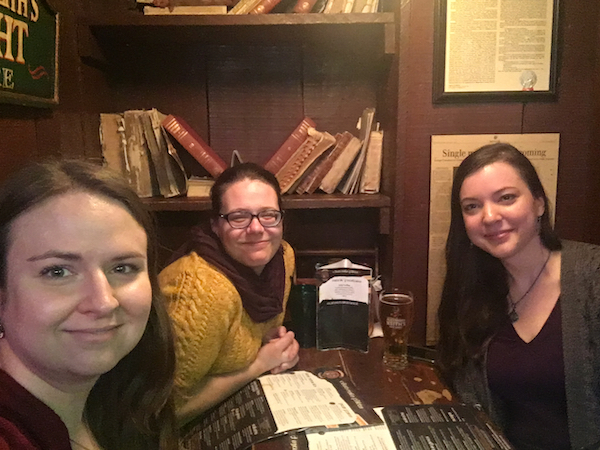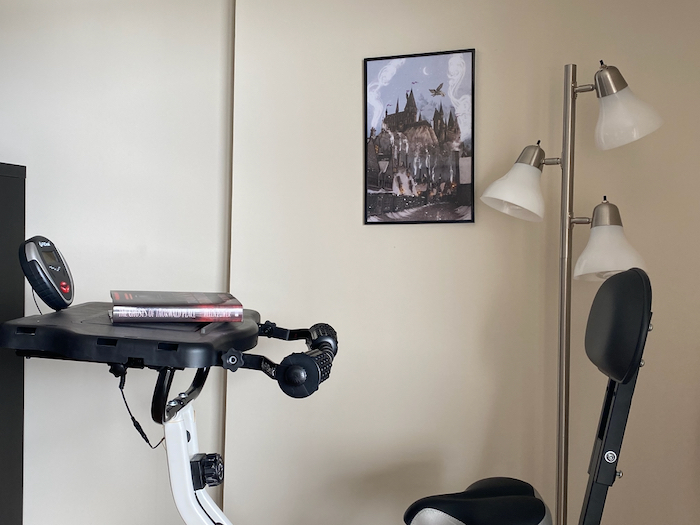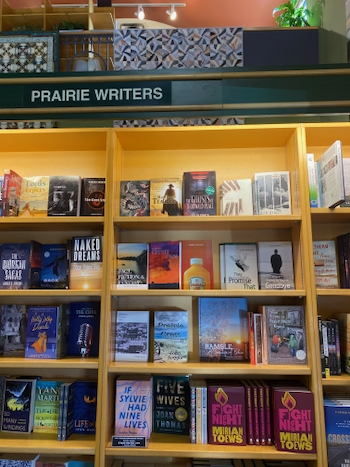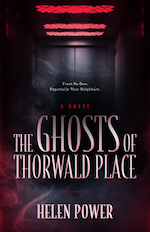For those who are Type A personalities like myself, it can be difficult to shut off and relax.
When you’re a Type A personality and a writer, you often feel like downtime is wasted time. Any time that I’m not at work or sleeping is time that should be spent marketing my book, maintaining my author platform, or writing.
To be clear, this is not a healthy mindset, and it’s the recipe for burnout, which tastes just as bad as it sounds.
My Beloved Writing Can Feel Like Yet Another Chore to Complete
This need to constantly be “doing” has been a difficult mindset for me to let go of, especially since it’s pervasive in my career path.
I’m an academic librarian, and in my institution, librarians have faculty status. My position is tenure track, and the pressure to over-extend with committee work, to publish in academic journals, and to prove my worth is, at times, overwhelming.
To add on top of this a side-hustle that devours my free time, and my beloved hobby of writing has become yet another chore to complete before I crash in bed at night exhausted and drained.
Pick 3 To-Dos a Day
There was a piece of advice that I received when I was first looking for a permanent job after graduating, and I feel like it applies well to any side hustle, especially writing.
I make myself a goal of doing three things a day that relate to my author platform or my writing. I do those three things, and then my to-do list for the day is complete.
For instance, my three to-dos could be:
- Make social media posts about the ebook sale for my novel.
- Spend thirty minutes searching for a place to publish my new short story.
- Write a rough draft of a book review for my book blog.
After I’ve done those three things, I’m done for the day. I’ll often curate a list of to-dos at the beginning of the week, and then I’ll mix and match every day, kind of like going to a buffet, picking my three daily goals, while maintaining a sense of the big picture of what needs to get done.
Dedicate Your Time to What Matters Most To You
I recently went to a workshop at a conference that was about values-based time management. The idea is not to get more done, but to ensure that you dedicate time to what matters most to you.
One of the activities was to determine your values. Do you value the power of storytelling, creativity, and/or freedom in your work? Make sure that you are regularly allotting time to do the things that matter to you.
So, for instance, if you value the act of writing itself above all else, ensuring that you allocate time for this activity every day will help you hold on to the feeling of accomplishment that it gives you.
Identifying your values will also help you to reframe mandatory projects to make them more palatable. For instance, all authors know that they have to have a platform of some sort. But if you value relationship building, you should focus on that in your online presence. Maybe creating a single account on a platform of choice where you focus on building those connections, rather than just pushing out content that your heart and soul isn’t in.
I love stories–sharing my own and consuming others. It’s for this reason that I am very active on Bookstagram and Goodreads, where I share my love of books by writing book reviews, all the while making sure that I remember to regularly promote my own work.
I’ve reframed promoting my novel as sharing my love of stories, which is more palatable to me than viewing it as making sales.
Join a Different Type of Writing Group
Writing is a solitary activity, and it can be isolating to have a passion in life that requires you to sit alone at a desk for the duration of the activity. There are some workarounds, including going to critique groups and attending writing conferences. While networking with other authors can be useful for the craft, it’s not necessarily fulfilling on an emotional front.
Helen Sword wrote a fabulous book called “Air & Light & Time & Space: How Academics Write”, which is targeted to academic and scholarly writers, but has content that’s applicable to all writers and creators. In it, she outlines that there are two main types of writing support groups.
There are the critique groups, the ones where you bounce ideas off each other, share writing, and provide feedback. This is the most commonly seen type of writing group.
But there’s also another type of writing group that doesn’t get as much attention. Groups of writers can provide much-needed emotional support. Finding like-minded individuals—ones who understand the struggles of writing and the isolation that comes hand-in-hand with the craft—is invaluable for your mental health.
When I lived in Windsor, Ontario, I joined a small group of writers who would meet monthly at a bar to chat about our writing. We would sometimes talk about our story plots, but the focus was on making connections with other writers, talking about our habits, sharing techniques for overcoming writers block, and expressing our challenges and struggles with people who understand and can relate.
I found that while critique groups have their value, this was the type of support that I needed. Joining this type of writing support group made a solitary pastime more social, and helped me to overcome the loneliness associated with it.

Fitting In Time for Fitness Time!
Both my day job and my hobbies—reading and writing—are quite sedentary. While I’ve always struggled with my weight, I have developed several approaches for becoming more active, while still getting work done.
A couple of years ago, I invested in purchasing an exercise bike that has a built-in desk. I was lucky to have gotten this just before the pandemic hit, and I used it a lot while working from home, since I lost the extra fitness in my work day that I would get trekking across campus for meetings.
This bike desk is an incredible investment, as it allows me to work on my laptop or tablet while working out. I often use it for an intense workout in the morning before showering, and then I use it off and on at a slower pace at random points throughout the day.
I also set up my laptop at the divider between my kitchen and my living room, which is at a perfect height for me to treat it as a makeshift standing desk.

I also use something called the Pomodoro technique. This is a simple method where you set a timer for 25 minutes, and you focus on your work for that time slot. Once the buzzer goes off, you take a short break, before repeating the process. While I often use it for helping me to focus on the task at hand, I find the little buzzer is a great reminder to get up, grab some water, stretch my legs, and struggle through a few push ups, before getting back to work.
When the weather is nice, I also like to go for walks with my notebook. I find this helps when I’m in the brainstorming process of writing. The external stimuli and mild exercise stimulates my creative juices and I’ll get random bursts of inspiration. I’ll find a park bench far down the river from my apartment and get some writing done.
The only downside to this is the potential for creepy men sidling up to you and asking “Whatcha doin’?”, but that’s only happened to me a handful of times. Fortunately, my writing expression can be quite fierce, and it usually scares off distractions and serial killers.

How I Find Time to Write In My Busy Life
I already mentioned briefly about how I’m an academic librarian, and one of the things I love about my job is how no two days look the same. I’m always embarking on new projects, trying out new initiatives, and engaging with new people.
This in itself can be exhausting, and sometimes when the workday ends, I’m depleted. Finding the time and energy to write can be a challenge.
I’ll often schedule time to write and hold that time sacred. That said, if I’m genuinely not in the mood to write, I won’t force myself to do it, unless I’ve found that I’m not “in the mood” to write a few too many times. Then, I realize, that it’s a form of writers block.
What I do in that case is I’ll use the Pomodoro technique. I’ll set a timer for 25 minutes and focus on writing for that time alone. You’ll be surprised how much you can get done in 25 minute increments!
Once 25 minutes has passed, if I’m still not engaged in my writing, I will let it go and do something else. At least then I’ve gotten a little work done, I’ve given it my best shot, and I’m not continuing to torture myself.

The Most Important Part of Book Marketing
One of the most important parts of marketing, in my opinion, is assessment. Getting a sense for what works and what doesn’t is really important.
If you keep tweeting about your new book release and none of the tweets are being engaged with, then it’s time to re-evaluate and figure out a new approach.
For instance, with Twitter, I’ve found that letting my personality shine through and being enthusiastic and using lots of emojis gets me more engagement than my drier tweets that are purely informative.
Unfortunately, when you’re traditionally published, it’s a lot harder to figure out what marketing techniques contribute to more sales. I can see reviews on Goodreads and Amazon, and from there I can guess which techniques are more effective. I’m very active on Goodreads, and I have a lot of friends and followers who check out my book reviews.
Whenever I promote my novel, either by talking about a sale or highlighting a new review, I get engagement from these friends, regardless of if they have any intention of reading my book. Because they themselves have a large following, this engagement spirals, getting my book seen by more people on Goodreads.
And Goodreads is a community of readers, so you know that people on that platform are more likely to be interested in checking out my book than, say, a random person on Twitter.
Advice for a Young Writer: Read Widely and Keep a Notebook
I have two pieces of advice:
- Read widely and read various genres. Some authors only read the genre that they write, and they’re missing out on a lot that they can learn about style and plot.
- Keep a notebook while you’re reading and make note of what works for you and what doesn’t. What tropes feel like clichés? What characters are you most drawn to? Do you prefer stories that are jam-packed with description or fast-paced stories? What plot twists are you most able to predict, and conversely, what stories have left you reeling?
Understanding what you enjoy as a reader will provide invaluable insight into how to write a story that you, yourself would love.
* * *
Helen Power is an academic librarian living in Saskatoon, Canada. In her spare time, she haunts deserted cemeteries, loses her heart to dashing thieves, and cracks tough cases, all from the comfort of her writing nook. She has over ten short story publications, including ones in Suspense Magazine and Dark Helix Press’s Canada 150 anthology “Futuristic Canada”. Her debut novel, a supernatural thriller, The Ghosts of Thorwald Place, was published October 2021 by CamCat Books.
For more about Helen, please visit her website, and connect with her on Instagram, Twitter, Goodreads, TikTok, or Facebook.
 The Ghosts of Thorwald Place:
The Ghosts of Thorwald Place:
Trust No One. Especially your neighbors.
Rachel Drake is on the run from the man who killed her husband. She never leaves her safe haven in an anonymous doorman building, until one night a phone call sends her running. On her way to the garage, she is murdered in the elevator. But her story doesn’t end there.
She finds herself in the afterlife, tethered to her death spot, her reach tied to the adjacent apartments. As she rides the elevator up and down, the lives of the residents intertwine. Every one of them has a dark secret. An aging trophy wife whose husband strays. A surgeon guarding a locked room. A TV medium who may be a fraud. An ordinary man with a mysterious hobby.
Compelled to spend eternity observing her neighbors, she realizes that any one of them could be her killer.
Available at CamCat Books, Amazon, and wherever books are sold.

